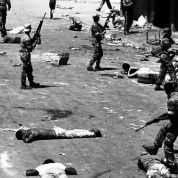February 27 is an awkward day for relics of Venezuela's neoliberal past. In 1989, this day marked the beginning of the end for the country's Fourth Republic, an era of two party politics sandwiched between the dictatorship of the 1950s and the new constitution of 1999.

While 1999 is remembered as the moment of victory for the new Fifth Republic, 1989 is remembered as the final defeat for the old Venezuela. From February to March that year, thousands of Venezuelans took to the streets to protest the rising cost and collapsing standard of living. The protests were met with a massive crackdown by state security forces. In what is now known as the Caracazo, as many as 2000 people died on Venezuela's streets; most were killed by security forces in the capital, Caracas.
The Caracazo was the final nail in the coffin of the legitimacy of the Fourth Republic, and the neoliberalism it had adopted. Shortly before the Caracazo broke out, the newly elected president Carlos Andres Perez accepted a deeply unpopular bailout from the International Monetary Fund. Under the deal, Venezuela received a US4.5 billion loan in exchange for deep austerity commitments, including the loosening of gasoline subsidies. This immediately let to fuel prices skyrocketing, prompting a sharp jump in consumer costs for public transport. It was these price rises that led to the massive protests that began on February 27, 1989.
Perez' government is long gone, but proponents of neoliberalism are making a comeback in Venezuela.
ANALYSIS: Latin American Unity in the Light of Right-Wing Resurgence
The country's newly elected National Assembly head, Ramos Allup now leads the Democratic Action party (AD) – the same political organization that put Perez into power.
For over a decade, Allup seemed like a slowly decaying relic of the past. Today, his resurrection has the supernatural air of a George Romero film.
In 1989, Allup was one of AD's most strident supporters of neoliberalism, and he publicly defended the economic measures that led to the Caracazo. During the Caracazo and its aftermath, Allup supported the suspension of civil rights. Constitutional safeguards on the right to protest and freedom of expression were suspended during the Caracazo. He was later the legal adviser of Carlos Andrés Pérez.
A decade later, Allup fiercely opposed the 1999 constitution. This was the first constitution ever approved by popular vote in Venezuela's history, and dramatically expanded human rights guarantees. Allup preferred Venezuela's previous constitution, which enforced the Punto Fijo system – a political deal that effectively barred parties independent of AD and its partner COPEI from taking power. The previous constitution also had far fewer human rights guarantees. In short, Allup's preferred form of governance is a system where neoliberalism reigns supreme, and dissent wasn't tolerated.
Internationally, the right-wing's comeback in Venezuela has been largely hailed as a victory for democracy. But with Allup and his ilk now wielding more power than any other time since 1999, the ghosts of the past are becoming increasingly difficult to ignore.